How to Start a Zero-Waste Coffee Routine at Home
Embarking on a zero-waste coffee routine at home is an enriching journey toward sustainability. Begin by selecting eco-friendly products, such as reusable coffee cups made of materials that withstand daily use. Integrate practices like using coffee grounds as fertilizer in your garden, enhancing plant growth while minimizing waste. To further this initiative, invest in a quality coffee maker that avoids single-use plastics, contributing to a zero waste kitchen. Focus on buying coffee beans in bulk to reduce packaging waste, supporting local roasters when possible. Each small change builds towards a more sustainable, environmentally friendly coffee experience at home.

Understanding Zero Waste Principles
The concept of zero waste is rooted in the idea of minimizing waste and maximizing resource efficiency. It's about rethinking how you consume and dispose, aiming to make the most of what you have. In a zero waste kitchen, every step, from purchasing to disposal, is scrutinized to reduce waste as much as possible and contribute positively to the environment.
One of the most frequently asked questions about implementing these principles is how to effectively manage coffee-related waste. You can start by using reusable coffee cups to cut down on disposable waste. From there, every action, such as repurposing coffee grounds as fertilizer, contributes to a sustainable lifestyle.
This process is more than just recycling; it involves reducing overall consumption and reusing whenever possible. In the context of starting a zero waste coffee routine, it includes carefully selecting products and processes that have minimal ecological impact, thus embodying zero waste principles.
By understanding and adhering to zero waste principles, you weave sustainability into your daily coffee ritual seamlessly. As you adopt this mindset, you align your habits with a growing environmental consciousness, transforming how you engage with your beloved beverage daily.
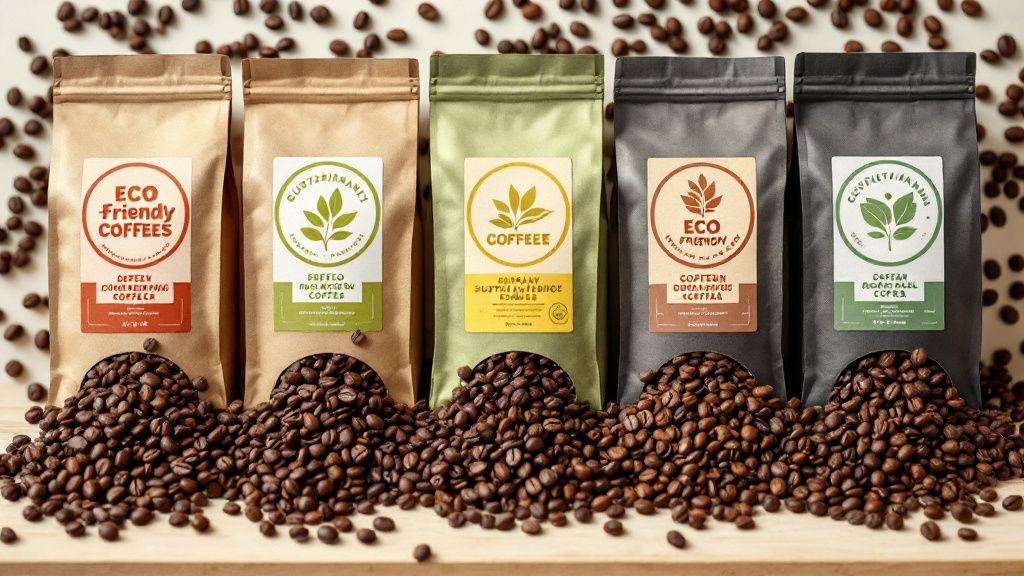
Choosing Sustainable Coffee Beans
Sustainable coffee beans are essential for a zero-waste coffee routine, as they impact both environmental and social aspects of production. Look for coffee labeled as Fair Trade or Rainforest Alliance Certified, which ensures ethical practices and supports sustainable agriculture. These certifications guarantee that farmers are paid fairly, and environmental standards are maintained during production, making your coffee habit more sustainable.
To make sustainable choices, try purchasing coffee beans directly from local roasters who prioritize eco-friendly methods. This not only reduces transportation emissions but also supports small businesses committed to sustainability. Selecting whole beans in minimal packaging further supports your zero waste kitchen efforts, as you can control the waste involved in storage and preparation.
Incorporating sustainable beans into your routine requires a bit of research but significantly contributes to a more environmentally responsible lifestyle. Many roasteries provide detailed insights about their sourcing methods, allowing you to stay informed about the origins of your beans. As you enjoy your cup of coffee, the knowledge that you are supporting sustainable practices enriches the experience.
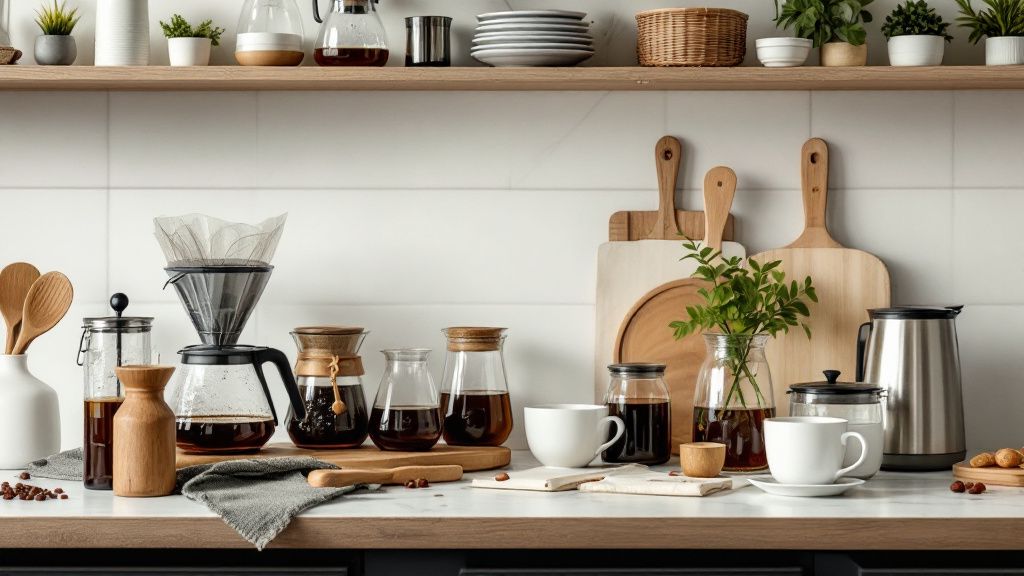
Eco-Friendly Coffee Brewing Methods
Brewing coffee using eco-friendly methods not only enhances flavor but reduces waste significantly. Consider using a French press, moka pot, or pour-over setup to minimize environmental impact. These methods eschew disposable filters and pods, aligning with zero waste principles. By opting for multi-use tools, you contribute less to landfill waste and make your coffee routine more sustainable.
The current trend in coffee brewing leans towards minimalist and sustainable approaches. Many coffee enthusiasts are gravitating towards manual brewing methods due to their efficiency and waste reduction potential. Investing in gadgets that last for years and require no electricity or disposable components aligns perfectly with a zero-waste kitchen approach and reduces your carbon footprint significantly.
To complement your eco-friendly setup, consider composting the resulting coffee grounds as fertilizer. This small step turns waste into nutrient-rich matter, enriching your garden soil while minimizing landfill contributions. Pairing these practices with reusable coffee cups completes a holistic approach to your sustainable coffee routine, emphasizing responsibility and environmental mindfulness.
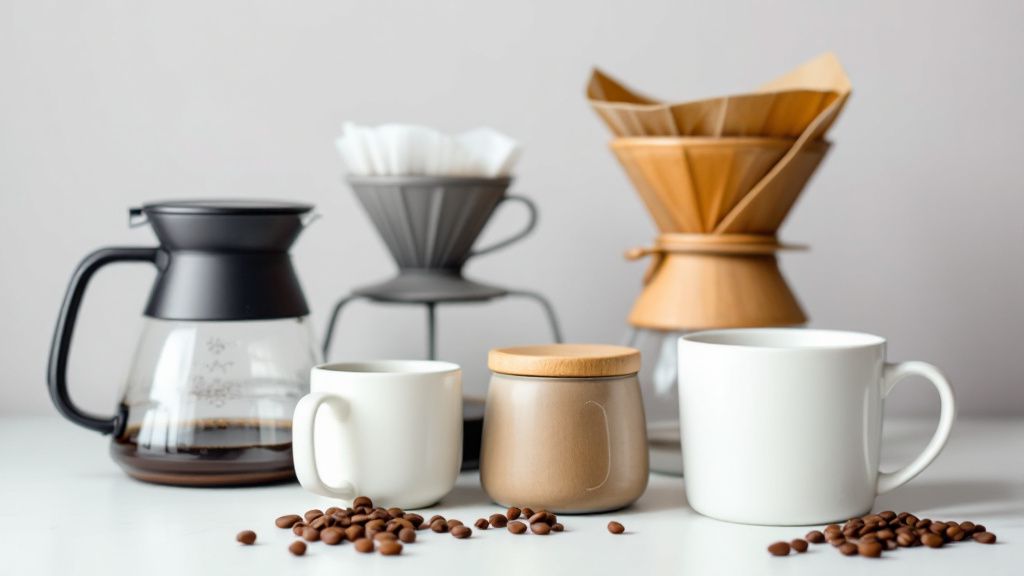
Investing in Reusable Coffee Gear
Investing in reusable coffee gear is a crucial step in establishing a zero-waste coffee routine. By choosing durable, high-quality items, you reduce the reliance on disposable products. Options such as stainless steel or glass coffee cups provide a long-lasting alternative to single-use plastics, ensuring you contribute less to landfill waste while maintaining your coffee drinking habits.
Comparing reusable coffee gear versus disposable items highlights the long-term benefits both environmentally and economically. While the initial investment in reusable items like insulated mugs may be higher, the savings accumulate as you avoid repeatedly buying disposable versions. These reusable items are designed for longevity, significantly reducing waste and saving money over time.
In addition to reusable cups, consider incorporating items like stainless steel filters and manual grinders into your routine. These tools further reduce the need for disposable products and align with a zero waste kitchen philosophy. By committing to sustainable coffee gear, your daily ritual becomes more eco-friendly, supporting broader environmental goals while enjoying your favorite beverage.
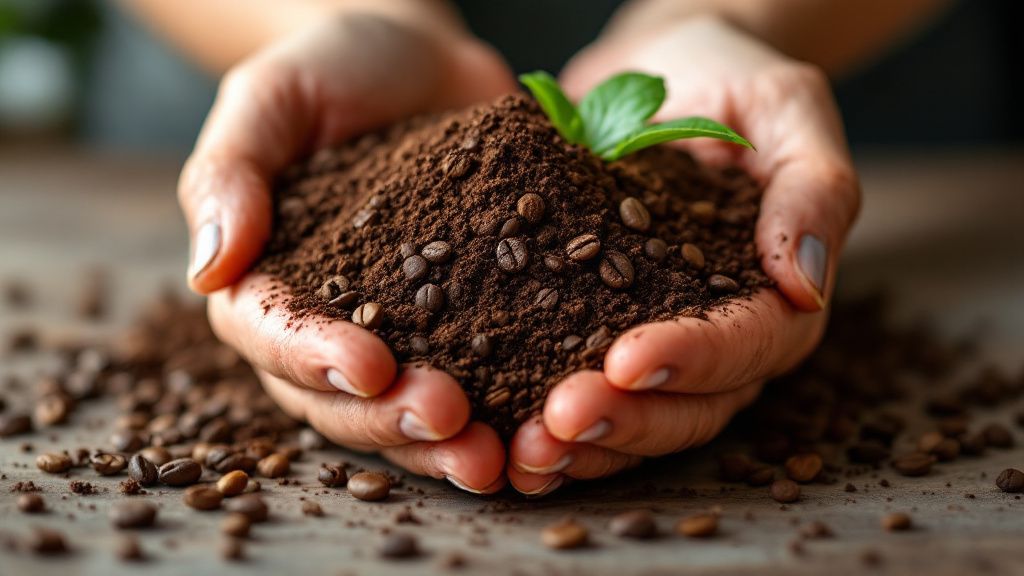
Reducing Waste from Coffee Grounds
Reducing waste from coffee grounds is a critical aspect of a zero-waste coffee routine. By repurposing spent grounds, you can transform what is typically discarded into a valuable resource. Coffee grounds make excellent fertilizer, enriching soil with nutrients, which reduces the overall waste you produce. This practical use also demonstrates a commitment to sustainable practices and a zero waste kitchen environment.
On one hand, some see coffee grounds as nothing but waste destined for landfills, adding to global environmental challenges. However, others argue that these grounds are an untapped resource, capable of enhancing garden soil, deodorizing spaces, and even exfoliating skin. Embracing this second perspective helps align your coffee routine with eco-friendly values and maximizes resource utilization.
Exploring creative uses for coffee grounds can further deepen your commitment to sustainability. Incorporating them into your garden or even crafting DIY household products showcases the versatility of something often overlooked. By embracing this mindset, you keep more materials in use and reduce your environmental impact, supporting a zero-waste lifestyle through thoughtful action.
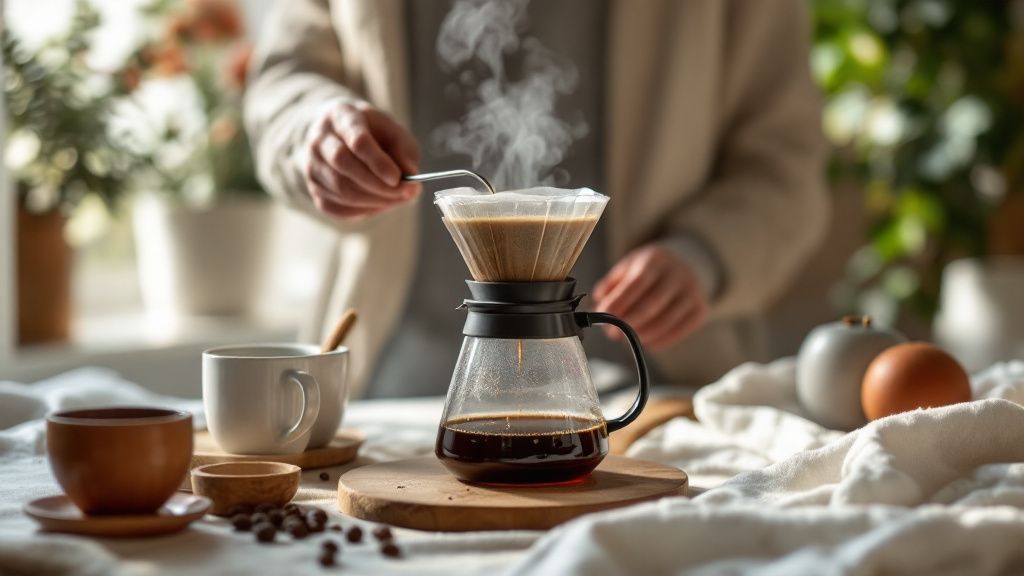
Creating a Coffee Ritual
Creating a coffee ritual centered around zero-waste principles can elevate your daily routine into a mindful practice. Integrating reusable coffee cups and selecting sustainable beans are initial steps that personalize your experience. Every brew becomes an opportunity to consider the choices you make, reinforcing the connection between daily habits and their environmental footprint.
Enhancing your ritual can include transforming used coffee grounds as fertilizer, nurturing your garden, and minimizing waste output. This action not only supports a zero waste kitchen environment but also connects your coffee routine to broader sustainability efforts. It's a practical way to close the loop, turning potential waste into a beneficial resource.
Inviting mindfulness into your coffee ritual emphasizes quality over quantity. As you appreciate the aroma and taste, reflect on the journey your coffee has taken to reach you, from seed to sip. This awareness deepens your connection to the process, reminding you that each choice aligns with sustainable living principles and your role within this larger environmental framework.
 Ratio Eight S2
Ratio Eight S2
 Ratio Eight Original
Ratio Eight Original
 Ratio Six
Ratio Six
 Ratio Four
Ratio Four
 Compare Machines
Compare Machines






